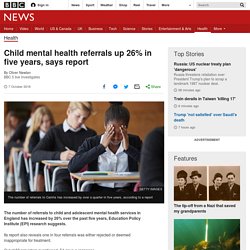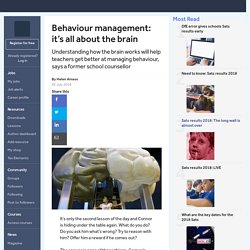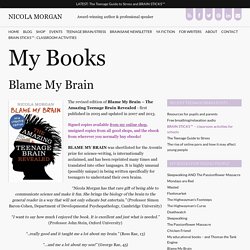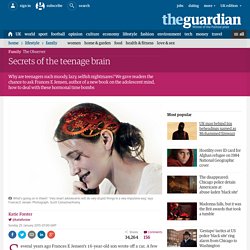

Dan Siegel - "The Adolescent Brain" The evolutionary advantage of the teenage brain. Teens.

OMG. What on earth is going on inside their brains to make them act so, well, like crazy teenagers? The mood swings, the fiery emotions, the delusions of immortality, all the things that make a teenager a teenager might just seem like a phase we all have to put up with. However, research increasingly shows that the behaviors of teenagers aren’t just there to annoy parents, they serve a real evolutionary purpose.
Changing minds What is a teenager? “From a neuroscience perspective, we know that the brain keeps growing and developing,” said Adriana Galván, associate professor of psychology at UCLA and director of the UCLA Developmental Neuroscience Lab. It’s not that the brain stops changing — every time we learn something new, our brain changes — but by around 25, our brain has finished its long process of structural development. BBC Radio 4 - Woman's Hour - The teenage brain: Seven things parents should know about adolescent behaviour.
Child mental health referrals up 26% in five years, says report. Image copyright Getty Images The number of referrals to child and adolescent mental health services in England has increased by 26% over the past five years, Education Policy Institute (EPI) research suggests.

Its report also reveals one in four referrals was either rejected or deemed inappropriate for treatment. Out of 60 providers questioned, 54 gave a response. The Department of Health said it was investing an additional £1.4bn into mental health services for children. The figures, shared with BBC Radio 5 live Investigates, were compiled using Freedom of Information (FOI) requests submitted to child and adolescent mental health services (Camhs) and local authorities in England.
Some providers in England were unable to give the full information requested - 33 supplied data about numbers of referrals over five years. Based on these figures, mental health referrals for under 18s increased from 157,000 in 2013-14 to 198,280 in 2017-18. 'I felt I wasn't taken seriously' 'Rejected'
Behaviour management: it’s all about the brain. It’s only the second lesson of the day and Connor is hiding under the table again.

What do you do? Do you ask him what’s wrong? Try to reason with him? Offer him a reward if he comes out? The answer is none of these things. But speaking last week at the 2018 IPEN Festival of Positive Education in Fort Worth, Texas, former school counsellor Lyndsay Morris explained how learning about the brain can help teachers to better understand how to help pupils like Connor.
It all starts with understanding how our brains process stress, she says. Drawing on a model developed by Dr Dan Siegel, clinical professor of psychiatry at the UCLA School of Medicine, Morris explained that we can think of the brain as being like a house, with three distinct floors that are connected to each other. At the bottom, you have the “basement brain”.
The Science of Practice: What Happens When You Learn a New Skill. Growth Mindset Video. BRAIN POWER: From Neurons to Networks. Blame My Brain. The revised edition of Blame My Brain – The Amazing Teenage Brain Revealed - first published in 2005 and updated in 2007 and 2013.

Signed copies available from my online shop, unsigned copies from all good shops, and the ebook from wherever you normally buy ebooks! BLAME MY BRAIN was shortlisted for the Aventis prize for science-writing, is internationally acclaimed, and has been reprinted many times and translated into other languages. It is highly unusual (possibly unique) in being written specifically for teenagers to understand their own brains. “Nicola Morgan has that rare gift of being able to communicate science and make it fun. She brings the biology of the brain to the general reader in a way that will not only educate but entertain.” “I want to say how much I enjoyed the book. . “..really good and it taught me a lot about my brain.” “…and me a lot about my son!” I do many events for teenagers and for adults who wish to understand about teenage behaviour and be reassured about it.
Teen brain - science and risk. Secrets of the teenage brain. Several years ago Frances E Jensen’s 16-year-old son wrote off a car.

A few years earlier, her other son had returned from a friend’s house with his hair dyed jet black. The University of Pennsylvania neurologist was finding her teenagers’ erratic behaviour increasingly taxing, so she decided to study teenage thought processes and gathered her research in the book The Teenage Brain. She found that while much had been written about teen psychology and parenting, no one had explained the neurons and cerebral connections that make those years such a unique – and terrifying – part of growing up.
The teenage brain has only recently become a subject for serious research, which shows how little was known about it. But does knowing what is going on in a teenager’s brain make them any easier to live with? Given that the relationship between parents and teenagers is one of the most fraught in family life, we asked readers to send in questions for Jensen to tackle.